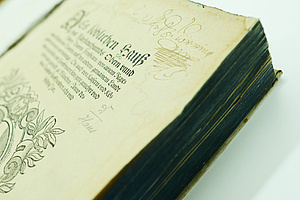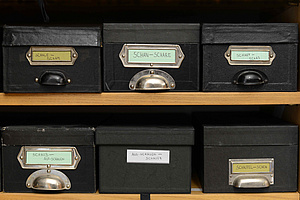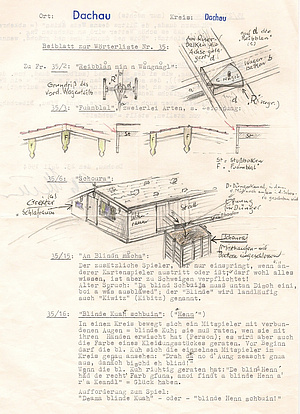Collecting the Material
The dictionary archive comprises about seven million examples of dialect usage from various surveys and excerption of the literature.
A large contribution came from informants who filled in the questionnaires and provided word collections. To them particular thanks are due. Without the help of these volunteers, the dictionary just would not have been possible.
The dictionary’s collection is to a great extent derived from volunteer participation from all sectors of Bavaria’s population go to our informants, without whose help this dictionary would not be conceivable.
Over the years, numerous fans of the vernacular and interested researchers have also supported our dictionary project. Libraries and archives, city and community administrations, primary schools, friendly institutes and other institutions have made active contributions to our research.
Collectors’ Material
Since 1913 several surveys have been conducted:
1913–1933: Systematic Questionnaire
1927–1933: Field Exploration Catalogue
1927–1940: Dialect Geography Questionnaire
1934: Maurer Questionnaire
since 1958: Word Lists
See the Surveys in Detail
Literary Sources

The works of classic Middle High German literature from Bavaria are only included in exceptional cases, due to the well-known adaptation to supra-regional norms. Medieval and Late Medieval sources are included only if locatable and datable, so for instance the texts of Konrad von Megenberg or Aventinus. To a lesser extent unedited archival sources are cited, among others from Amberg, Landshut, Munich, Regensburg, Rosenheim. The oldest usage examples date back to the 8th century.
More recent vernacular literature, grammars and regional dictionaries have also been excerpted, as have Bavarian word collections and the scientific and folkloric literature. Currently there are about 800,000 index cards archived from literary sources.
To the bibliography of literary sources.
Creating an Archive

Parallel to material collection, in order to systemise and order the large and ever-growing amount of language data, an ordered archive had to be compiled. All examples of dialect words have been ascribed to headwords, so-called lemmas, and filed in alphabetical order.


![Belegzettel zu den Stichwörtern „Maunzelein”, „[Gilet]tasche” und „[Geld]beutel” [Translate to English:] Belegzettel zu den Stichwörtern „Maunzelein”, „[Gilet]tasche” und „[Geld]beutel” (Exzerpt aus dem Münchner Stadtanzeiger vom 8.4.1960)](/fileadmin/_processed_/0/9/csm_05_Gilet-taschel_ea8616ef8b.jpg)